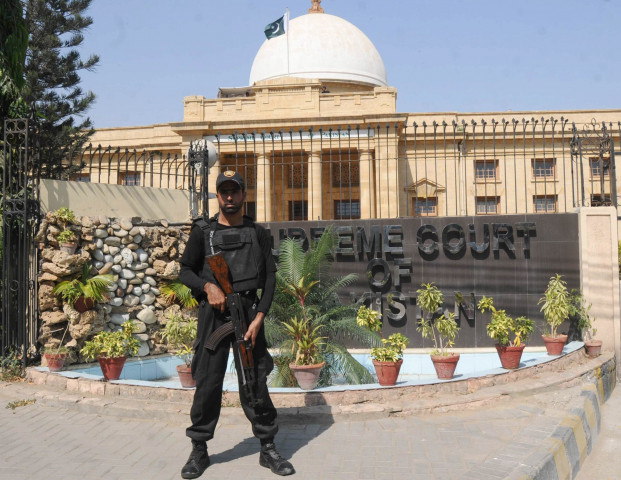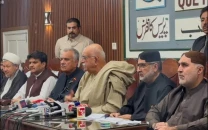Karachi suo motu case: SC summons AG to explain govt inaction
Court says the Centre is bound to assist provincial govt under Article 148(3).

The judges noted that the provincial government and the law-enforcement agencies had failed to improve the situation in Karachi. PHOTO: EXPRESS/FILE
The Supreme Court summoned the Attorney General of Pakistan to present a report on the federal government’s stance on assisting the Sindh government in curbing the unabated violence and crime in Karachi.
During Wednesday’s hearing of the suo motu case on the law and order situation in Karachi, the apex court questioned the role the federal government had played – under article 148 of the Constitution – in assisting the provincial government in maintaining order in the violence-ridden metropolis.
A larger Supreme Court bench, headed by Chief Justice Iftikhar Muhammad Chaudhry, resumed the hearing of the Karachi suo motu case that had earlier ordered the implementation of its October 2011 verdict to curb target killings and called for political parties to stop supporting criminal groups.
The bench also comprised Justice Jawwad S Khawaja, Justice Gulzar Ahmed, Justice Muhammad Athar Saeed and Justice Sheikh Azmat Saeed.
On Wednesday, the judges noted that the provincial government and the law-enforcement agencies had failed to improve the situation in Karachi, despite orders and directives being issued in its October 2011 judgment to control the lawlessness in the city.

Attorney General Munir A. Malik was not present during the hearing.
The bench asked the Deputy Attorney General (DAG), Ashiq Raza, to explain what steps had been taken in Karachi, who said that the federal government had deployed the paramilitary Rangers and the Frontier Constabulary (FC) to assist the provincial Sindh police.
When asked why the situation had not improved yet, he replied that it had become a provincial subject under the 18th Amendment, which devolved federal institutions to the provinces. Therefore, the federal government could not interfere, he explained. According to the DAG, he also filed a report in this regard in February this year. However, the report has no reference number – without a reference number, one cannot prove that a document was officially submitted to the court.
“It shows that the federal government has no interest because it’s a provincial matter,” remarked Justice Jawwad S. Khawaja.
Chief Justice Iftikhar Chaudhry asked the DAG to read Article 148(3) of the Constitution and the federal government’s duties as provided in it aloud in the court.
“It shall be the duty of the Federation to protect every Province against external aggression and internal disturbances and to ensure that the Government of every Province is carried on in accordance with the provisions of the Constitution,” he read out.
After this, he requested more time to collect instructions from the federal government on the matter.
The bench recalled that it had also previously observed that the federal government is constitutionally bound under Article 148(3) to assist the provincial government in resolving the Karachi issue, but no steps had “apparently” been taken.
Published in The Express Tribune, August 29th, 2013.



















COMMENTS
Comments are moderated and generally will be posted if they are on-topic and not abusive.
For more information, please see our Comments FAQ